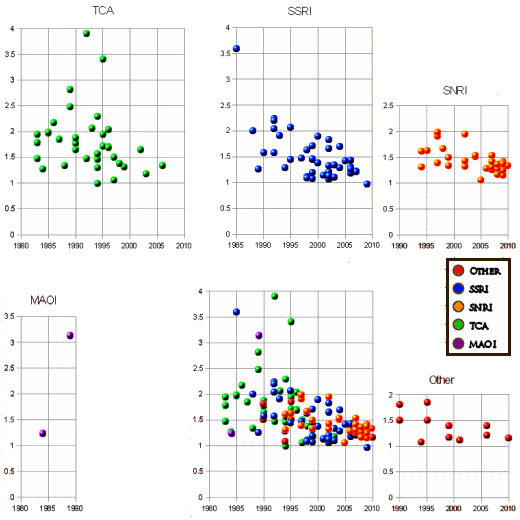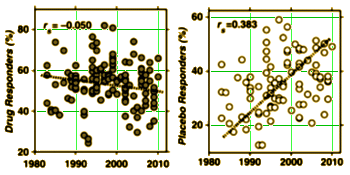I obviously thought that the article I reported on in my last post was important [what was that all about?…]. Yesterday was a clinic day, and in the spaces between, it came back to my mind. When I got home, I imported the table of the studies they included and graphed the RR [Response Rate] against the year of the study for each class of antidepressant. I wasn’t sure what I was looking for, I just wanted to see it all laid out [the bottom center graph is all of them combined – a color coded version of the upper right graph in the last post]:

I certainly agree with the authors’ conclusions:
-
"We suggest that efficiency and drug–placebo differences may be improved with fewer sites and subjects, and better quality-control of diagnostic and clinical assessments"
-
"Study findings generally support moderate efficacy of clinically employed antidepressants for acute major depression, but underscore limitations of meta-analyses of controlled trials for ranking drugs by efficacy"
I think I know why I wanted to see it all laid out – something like a testimonial that documents an epoch to remember.
With the coming of the SSRIs, depression became a biological entity, a chemical imbalance to be treated with a pharmaceutical agent – and the wisdom of the ages about depression seemed to evaporate before us. All clinically significant depression was Major Depressive Disorder, and it was to be treated with one of the blockbuster antidepressants that marched onto the market. As it became apparent that all depressed people didn’t respond to these new antidepressants, we entered an era of treatment-resistant depression – the patients that didn’t respond to our remarkable new drugs. First, that ushered in a focus on augmentation [Lithium, Thyroid Hormone, etc]. As it became apparent that there were a significant number of non-responders, we were lead into the world of algorithms and measurement-based care – they weren’t responding because we weren’t giving the drugs correctly, not following protocol. With algorithms came the idea of sequencing medications and combining medications [unsupported by expensive clinical trials]. The growing awareness that the response rates were far lower in fact than in the rhetoric didn’t dissuade the pundits. We needed drugs that hit more targets, like the SNRIs, which were folded into the algorithmic, measurement-based, sequences and combinations, with augmentation including the use of atypical antipsychotics. While the term chemical imbalance dissolved along the way, the chemicals continued to grow in number and complexity. And it’s still going on. There are several large studies and a lot of talk that genetic screening will specifically direct the choice of antidepressant, and thereby redeem the poor track record of the antidepressants.
Looking at the top row, there was never anything to suggest that the SSRIs were more efficacious than the older Tricyclic Antidepressants [TCAs] they replaced [it probably suggested the opposite]. For that matter, There’s nothing to confirm that the SNRIs were superior to the SSRIs, in spite of the claims made not just in ads, but by our pundits [KOLs]. If the graphs document any change at all, they show that the mean drug effect is remarkably flat while sugar pills are becoming dramatically more effective…

… an absurd finding that can only mean one thing – that the subjects in the studies don’t really have the disorder being studied – clinical depression. So the graphs document the deterioration of the quality of Clinical Trials and ultimately their scientific usefulness.
It resembles a terminal asymptote, doesn’t it?
That clinical depression is an elusive beast, isn’t it?